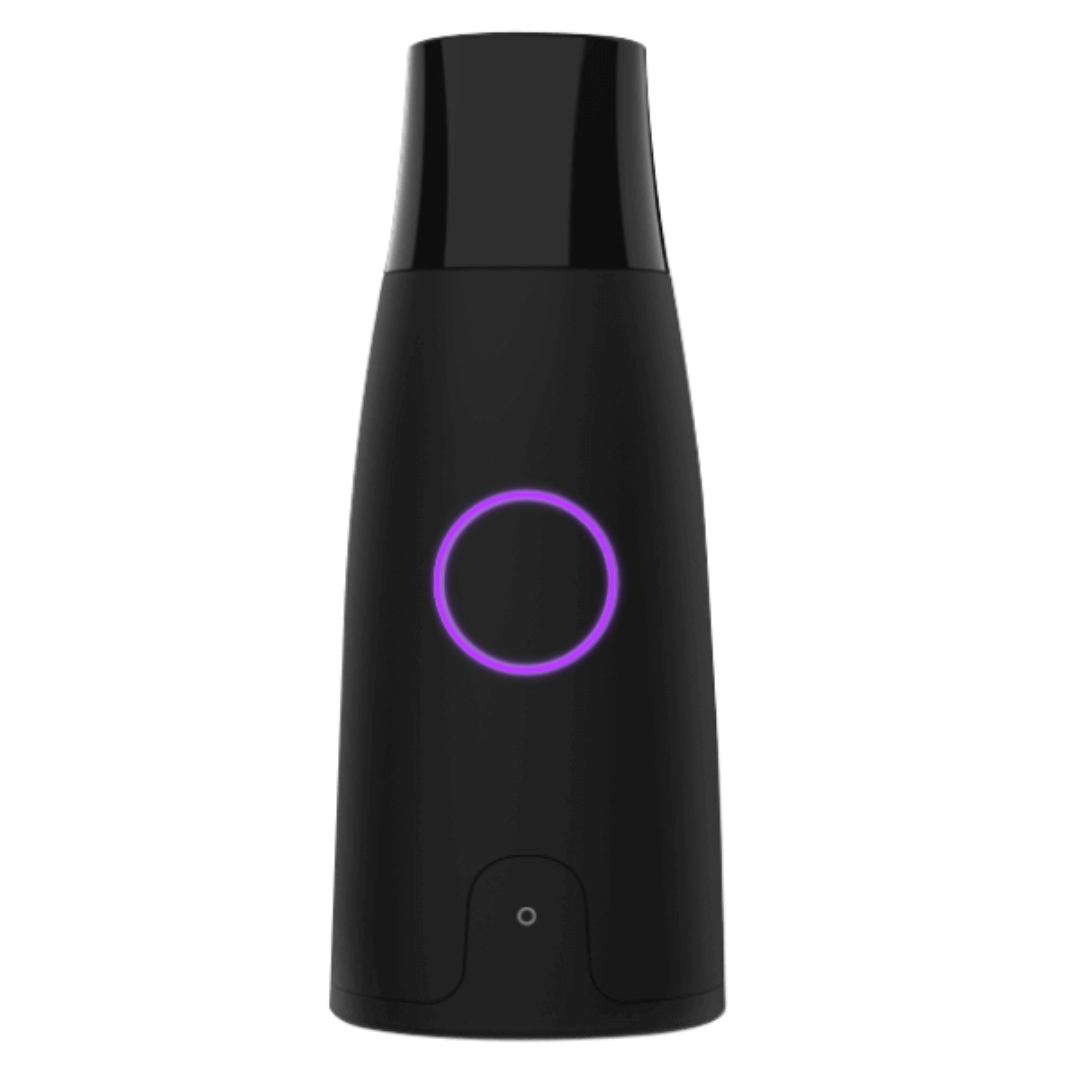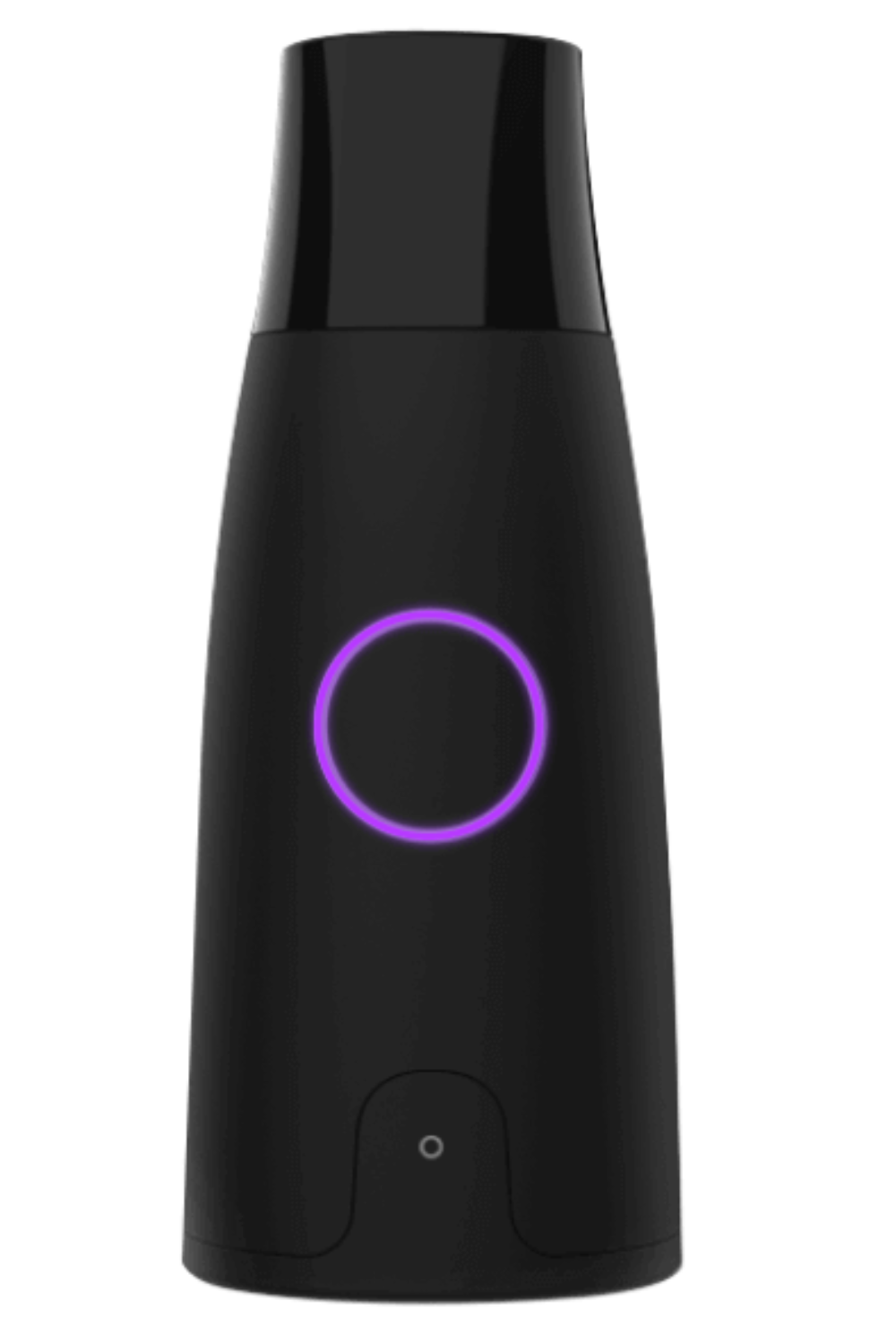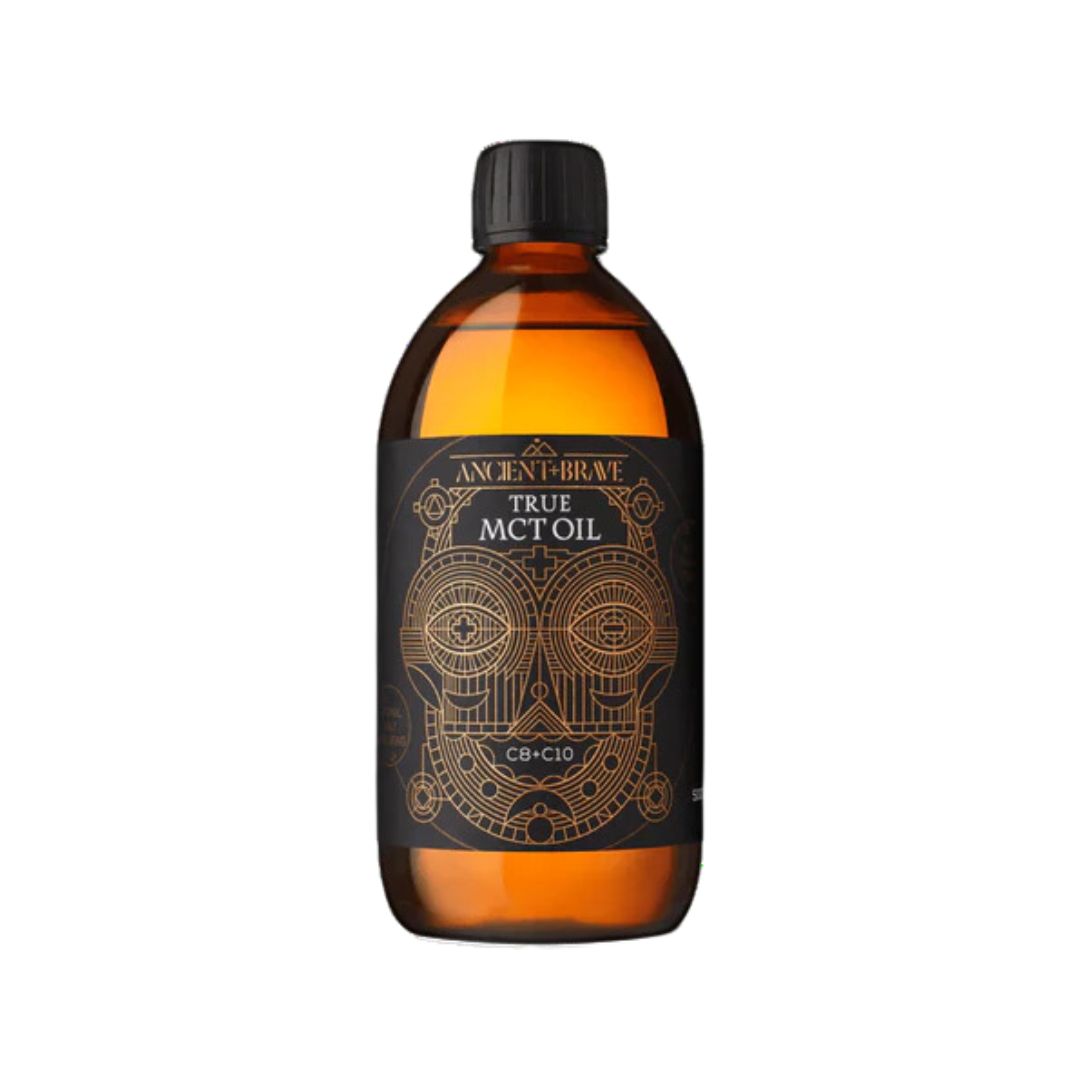I Tried the Lumen Device to Track My Metabolism for Six Months—and Learnt an Unbelievable Amount About My Body
Keen to master your metabolism?
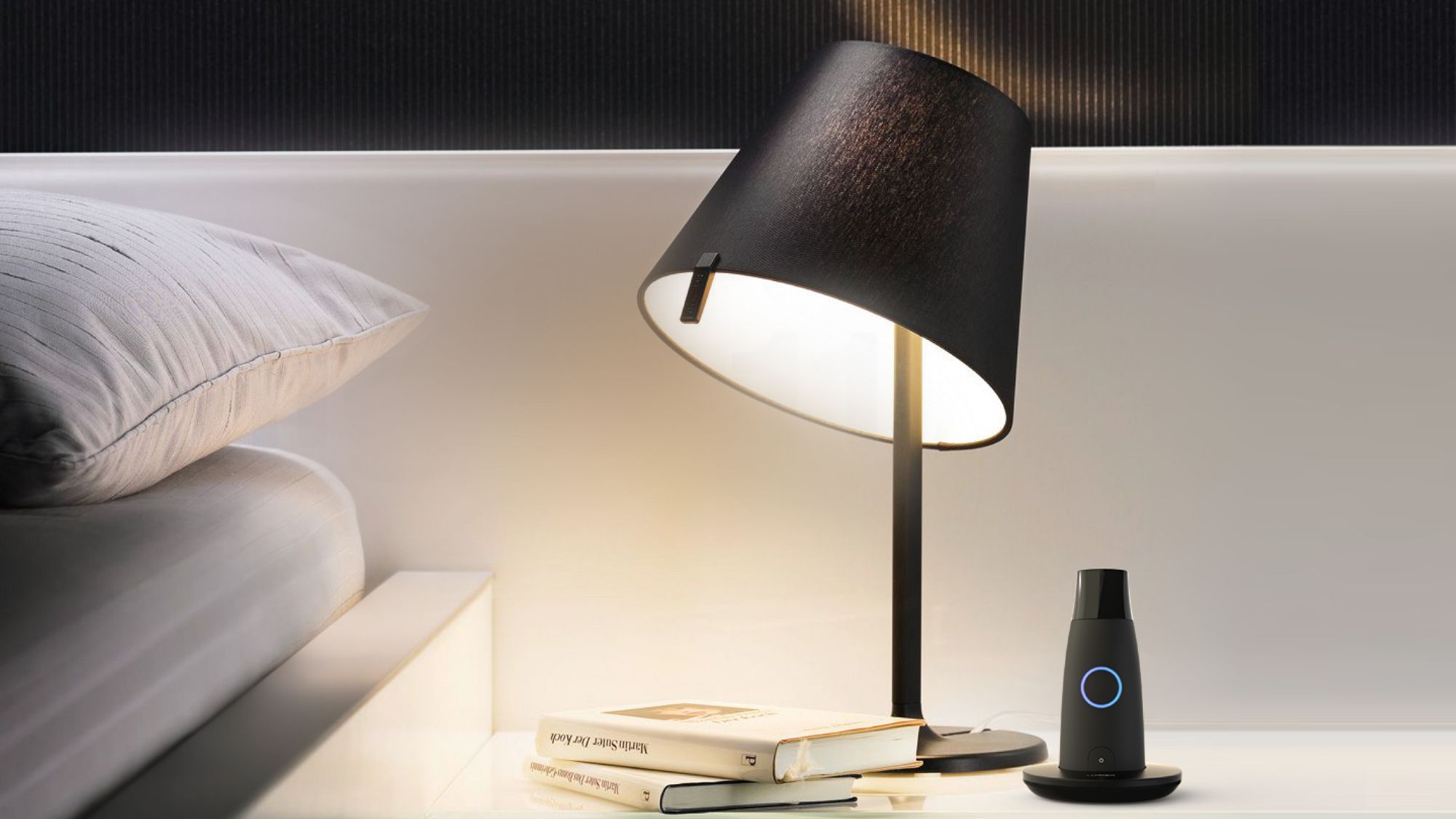
-
+
Its the only device of its kind
-
+
Easy to use
-
+
There's an incredible amount of data—that is both useful and easy to understand
-
-
On the pricey side of things
-
-
It requires a fair bit of effort—but this can keep you dedicated
-
-
It looks like a vape, so some people might think you're vaping at your desk—true story
- So, what exactly is Lumen?
- How does it work?
- How to get the most out of your device
- Review: How I found the Lumen device when testing
- Does Lumen help with fat loss?
- How much does it all cost?
- The monthly subscription includes:
- What the experts say about the Lumen metabolism tracker
- Our Editors' favourite fitness trackers

Whether you're just starting to get into your fitness journey or you indulge in half-marathons for breakfast, arming yourself with one of the best fitness trackers can be a helpful tool to aid your training and help you reach your health goals for the year ahead.
With a slew of new technology on the market, measuring your resting heart rate, tracking your readiness score (make sure you check out the Oura ring) or carrying your personal step tracker in your pocket has never been easier. Hacking your metabolism has always been a long-debated topic in the fitness world, and now, thanks to the Lumen, you're able to do so on the go.
I'd been seeing Lumen all over my social media for a while, which first piqued my interest in trying it out for myself. There has been a 50% increase in searches for the Lumen Metabolism Tracker over the last year, so the hype clearly isn't dying down any time soon.
To read how I got on putting the Lumen to the test over six months, keep scrolling. Below, I cover everything there is to know about its latest technology and most importantly, if it actually worked. And if this sounds like something that could work for you, too, it's worth knowing that the device is currently 50% off.
My honest Lumen review? It's been a game changer
So, what exactly is Lumen?
Put simply: Lumen is a handheld device that helps to identify where you sit on the metabolic spectrum.
Lumen was developed by two sister doctors, Drs. Michal and Merav Mor who were training for an Ironman Triathlon. They wanted to understand how to fuel for their competitions, what to eat and also what to avoid. They had the idea to create a handheld version of the RER (Respiratory Exchange Ratio) equipment that you find in hospitals and clinics, which lets you know your metabolism by measuring the amount of CO2 in your breath.
"It has always been our goal to contribute more knowledge on metabolism to the scientific community and make personalized nutrition more accessible so that we can finally understand the question of what we should be eating on a daily basis which actually works for our unique body", shares Dr. Merav Mor, Chief of Science at Lumen.
Celebrity news, beauty, fashion advice, and fascinating features, delivered straight to your inbox!
It took three engineers and over five years of work to perfect the device, with one 2020 study confirming it as the gold standard for measuring metabolism. Lumen is all about working out a nutrition plan—completely tailored to your body—and aims to be the anthesis of the restrictive diets we’ve seen over the years.
If that isn't enough to convince you, you might be interested to know that it's also a firm A-lister favourite. Personal trainer Don Saladino—who works with the likes of Blake Lively and Anne Hathaway—swears by the device for improving clients' metabolic flexibility and energy levels.
How does Lumen work?
Lumen's main goal is to understand and improve your metabolic flexibility (the body's ability to switch between burning fat or carbohydrates for energy) and, in turn, help you work out which foods to eat to boost your energy and mood.
It's no surprise that sleep and diet can have a direct effect on our metabolism (the brand recently published a peer-reviewed study with ARU Cambridge on the effects of high and low-carb diets and metabolism) and Lumen can help to identify how other lifestyle factors may contribute to metabolic flexibility.
So, how does it work? By monitoring your body’s carbon dioxide concentration—all you have to do is breathe into the handheld device. The levels of CO2 in your body indicate the type of fuel your body is using to produce energy.
Lumen says they "developed the CO2 sensor inside the device from scratch, and that's the key hardware that reads the levels of CO2 in your breath. If you have elevated CO2 levels in the breath, your body is burning carbs and lower CO2 levels means your body is burning fats."
Lumen took a technology that had already been used since the 60’s in top clinics and made it work from a single breath. It would normally takes 45 minutes and a trained technician to get these kind of results, which is not at all accessible for most people. That's where the Lumen device comes in.
The company now boasts the largest metabolic database in the world. Before Lumen, there were less than 1 million measurements. Now, there are over 65 million measurements and over 300,000 users. At the moment, the founders' main focus area is how women's metabolism is different to men's to help close the research gap and arm women with tools to track their own data and metabolism.
Top tips for using Lumen
Before I got started with the device, I set up a call with Mia Johanna Dige, metabolic coach at Lumen, to ask for advice for starting my journey. If you're starting with Lumen too, then make sure you read the below:
- Get the most out of Lumen: “To get the device working at its optimum, you need to do a measurement in the morning before you’ve eaten anything and have the option to do several other measurements across the day (before and after exercising and before bedtime)”.
- Protein, protein, protein: “Protein not only keeps you feeling fuller for longer but it helps with muscle growth and recovery,” says Dige, And, that we should be aiming for “at least 30% of each meal to be compromised of protein”.
- Knowing when to consume carbs: “Try to eat carbohydrates in the middle of the day and opt for more veg and protein in the evenings”. “Use your measurements to work out what types of carbs you eat as everybody responds differently to specific types of carbs”
- Lumen and Intermittent fasting: For those doing intermittent fasting, Dige recommends, “doing a reading every hour to see where you are and if you’re maintaining fat burn. This enables you to find the perfect window of fasting for your body.”
Lumen Metabolism review: so, how did I get on with it?
I’d first seen the device over my Instagram feed and after what I initially thought sounded good to be true, I decided to look into it and give it a go.
It’s worth stating that I’m a complete novice when it comes to macros—and let’s face it, exercise in general. I had a fairly sporty childhood but rather embarrassingly, after the age of 18, I stopped doing any form of exercise apart from countless hours spent raving on the dancefloors around Europe (does that count?).
I’m giving you this information because I want you to know the complete picture. Fast forward to today, and I'm on a journey of looking after and wanting to better understand my body. That’s where Lumen—and my recent love of biohacking—comes in.
I’ve been using the Lumen device for around six months now. Full disclaimer: I really struggled to get into the habit of using it at the very beginning, but now, it's become a part of me and completely slipped into my lifestyle and routine. Word to the wise: the chances of you becoming that guy that shares their newfound love and understanding of how their metabolism works, are quite high. At a recent dinner party (more on those later), I met a fellow Lumeneer—I'm coining that—and we extolled the virtues of said device to anyone that would listen.
Whatever your reasons may be; understanding how your body works so that you can choose the right training activities or foods that work for you, looking for something to provide insights to inform your training programmes, or if you simply want to use it for weight loss, there is no question about it, the Lumen is an extremely handy bit of kit.
I quickly worked out just how much the device points to sleep and, of course, diet. There wasn’t anything that I wasn’t allowed to eat. Instead, the daily-tailored nutritional plan focused on macros: carbohydrates, fats and proteins.
Once I got into the swing of it, the morning reading—done just before my hot water with lemon—no longer seemed like a chore. I will admit though, that during particularly busy periods I sometimes skipped a day or just didn't have the time. For example, travelling around cities for various fashion weeks often means I am sleep deprived, time-poor and make terrible decisions when it comes to what I'm consuming. It's also worth noting that I would eat whatever I wanted when I was out for dinner for either work or with friends and family.
For me, maintaining a level of distance from the incessant recording of data was key. I didn't want to become obsessed with it. When I missed a day or two (or a week, in some cases) then I simply made peace with it knowing that I would return to regular programming when I was ready.
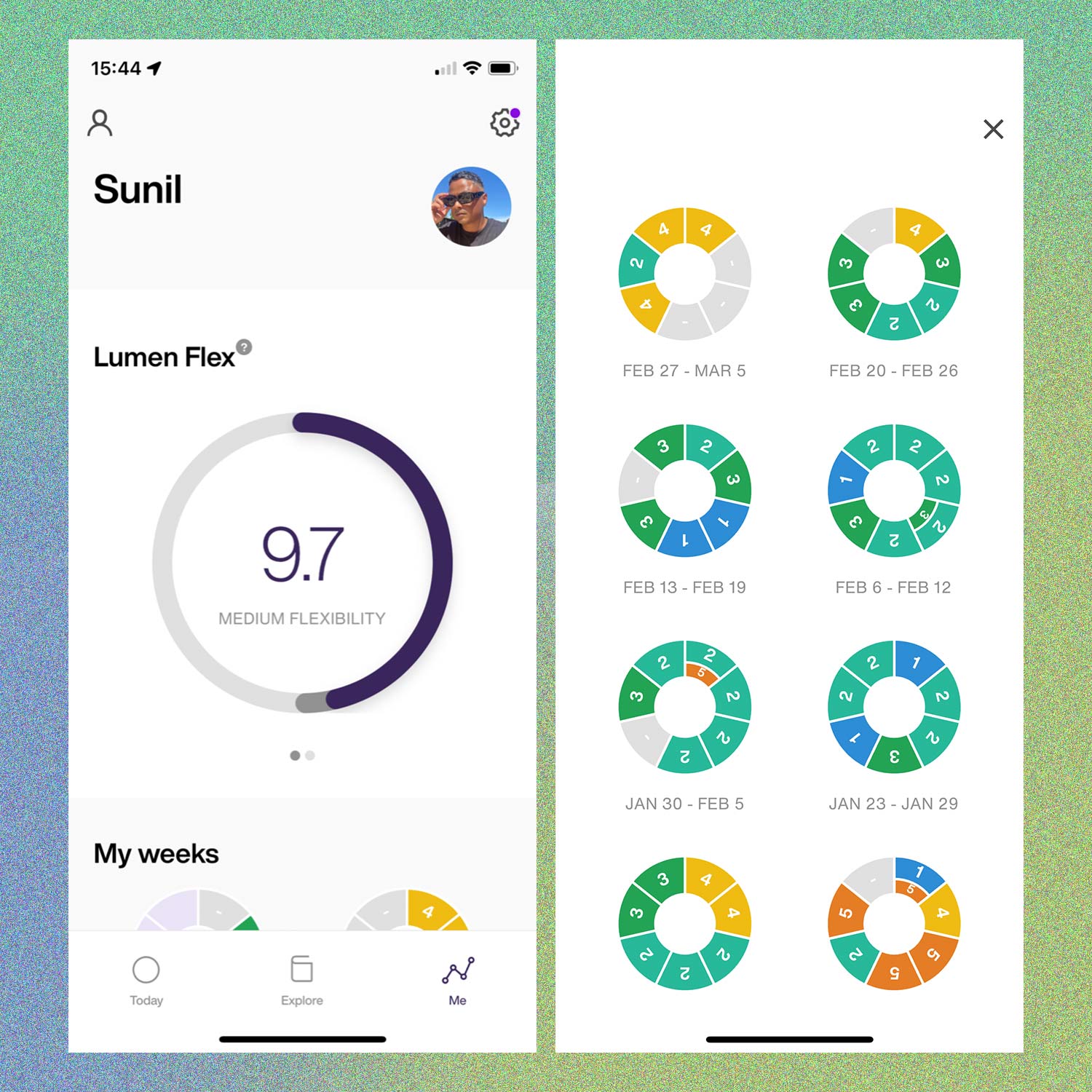
Does Lumen help with fat loss?
Now to the question you’re all thinking - can this device actually help me lose weight? The answer - well, it's a journey, but what you put in will most likely be presented in the results.
There are no quick fixes. My weight fluctuated by 5kg across the six-month period of use. I will be the first to admit that I didn't always completely stick to the plan and instead used it as rough guidance, so I know that this could’ve been better if I did.
However, several people that I bumped into made comments about my appearance—as an aside, maybe we need to look at the culture around that—and to be honest, I felt like I had shifted some of the weight. So, for me, it most definitely worked.
I was making better choices when it came to food and being more active by making small changes: instead of getting the tube, I decided to walk. I was averaging over 12,000 steps a day.
How much does it all cost?
So far so good. Now, let’s talk about the cost. The Lumen is available as a subscription service. You can typically get the device and 12 months free premium membership for £599. Memberships renew automatically, but you can cancel anytime and keep using your Lumen device.
Right now, however, you can score the Lumen device and a year's premium membership for just £299. That's an impressive 50% saving, making it a much more affordable investment.
Obviously, this is not cheap. However, it is cheaper than a gym membership but more expensive than your Netflix subscription. I’ve seriously had to question whether it was something that I would like to continue doing as the cost is significant. But when looking at the entire package and everything that is included, I think it's a great investment.
The monthly subscription includes:
- Macro tracking, meal ideas and tailored nutrition plans updated daily: It can be a challenge working out what to eat initially, so I found this extremely helpful.
- Food lists: This makes it super easy to categorise your ingredients.
- Portion guidance: I've gone 36 years with a rather skewed understanding of what one recommended portion size of rice actually is.
- Menu hacks: Very useful for when you’re eating out.
- Resources to help you along the way: It also has a library of easy-to-ingest—and understand—videos in handy categories such as little tips for getting the most out of the device, nutritional education as well as inspirational—but not in a naff way—messaging on your goals and mindset.
- Food logging: Use photo and barcode scanning to log what you're eating.
- Integrations with Apple Health, Google Fit, and Garmin: This is especially helpful if you wear a smartwatch daily and want to keep on top of your stats.
What the experts say about the Lumen metabolism tracker
"Lumen provides the necessary biofeedback to make necessary health and nutrition changes", Dr. John Whyte, chief medical officer at Web MD.
"Based on this device, I get personalized recommendations for nutrition, sleep, physical activity, to help me improve my metabolism." Dr. William Li, author of Eat to Beat your Diet.
The verdict on the Lumen—Could I do all of this without the device?
You can measure your macros intake, track and record your workouts, and track your sleep via some other well-known trackers and apps but, to my knowledge, there is no other device currently on the market that enables you to track your metabolism.
Whilst some attempts to eat better or switch up your diet are often fads and short-lived, IMHO, Lumen provides the bases for a long-lasting approach to not only eating better but also understanding your body, Taking that into account, I do think that overall I will continue my subscription—even though it is quite pricey. It’s helped me on my journey.
The Lumen founders are also focused on empowering women with scientifically backed data related to how to eat and sleep—an area in which research is lacking. Lumen stats have shown that women experience a 17% increase in carb burn during the first half of the menstrual cycle and increased fat burn in the second half, which is why women tend to crave carbs much more during the first half of a period.
These are things that would be very difficult to keep track of—or even have knowledge of—accessibly without devices like Lumen. If stats like these about your own body particularly interest you, you will probably benefit from using Lumen too.
This article was first published in April 2024 and has since been updated.
Who should avoid using the Lumen device?
The Lumen might not be accurate for some people.
According to their website, Lumen advises that readings might not be accurate and so therefore is unsuitable for anyone with: Diabetes, Severe Asthma, COPD or for anyone that is pregnant. Plus, they go on to suggest that the nutrional recommendations may not be suitable for anyone with Cancer, Thyroid Disease or Cancer.
What does the device include?
Apart from the initial purchase and various plans, what else does the Lumen come with?
The device comes equipped with a travel case, charging dock, USB-C Cable, and Premium Customer Support. Users can download the app for free on the Apple App Store and on Google Play.
For a more in-depth look at how to boost metabolism naturally, we reached out to Jo Woodhurst, Director of Nutrition & Education at Ancient + Brave - find her expert-approved tips below…
Can monitoring my metabolism aid with fat loss?
According to Woodhurst, “much like any other aspects of wellness, there’s no one magic pill or button to ‘boost’ your metabolism but there are some healthy habits which will help to optimise your metabolic rate.”
She names staying hydrated as one of the most underrated aspects of boosting your metabolism: “many metabolic reactions and processes rely on optimal hydration with water. Getting enough water is key, but proper hydration also needs electrolytes, minerals which you can obtain through diet or using high quality electrolyte formulas.”
A nourishing diet is also key, according to Woodhurst, “ensuring you are prioritising good quality protein intake (which also often contain other micronutrients important for your metabolism), complex carbohydrates and healthy fats. Eating plenty of plants ensures you are also getting fibre and phytonutrients, both important for your gut microbiome which is known to impact weight management. Balancing your plates like this ensures you satiated after meals and reduces the need for snacking.”
Moving your body is also important for optimal metabolism. “Workouts are of course great”, states Woodhurst, “but alongside this also trying to inconvenience yourself throughout the day with NEAT activity (Non-Exercise Activity Thermogenesis) which can increase your metabolic rate. Think; taking the stairs instead of the elevator, parking a few blocks away from work and walking 10 mins to the office, getting up out of your chair regularly or using a standing desk.”
“Fasting has also been shown to support metabolism for fat loss” says Woodhurst, “but it’s important to find the right fasting protocol for you (especially if you’re a woman as it can affect hormones).”
Which types of food and drink help to boost metabolism?
Protein is the most important food group when it comes to boosting metabolism, according to Woodhurst: “because this macronutrient takes a lot of effort for the body to break down, it requires energy to do so. Prioritising protein also helps to balance blood sugars which in turn has an impact on our metabolic health.”
“Lots of other protein sources from whole foods also contain B vitamins which are important for energy production," Woodhurst continues, “plant proteins such as legumes also contain fibre which make a great combination for metabolism.” It’s also worth swapping out coffee for a green tea or matcha, as “the compounds such as EGCG and caffeine naturally found in matcha have been shown to have a positive effect on metabolism.”
Shop the best metabolism-focused products

Electrolyte-rich formulas like Ancient + Brave’s True Hydration help to boost your hydration levels, Woodhurst recommends taking this at certain points throughout the day (e.g. during or post exercise, post sauna, whilst travelling or even first thing in the morning) for the best results.
Right, so now you've learned all there is to know about Lumen tracker and boosting your metabolism, you're probably on the lookout for one of the best fitness trackers to complement your purchase. Lucky for you, team MC is well versed in fitness trackers and we've tried a fair few options. Keep scrolling to shop our top picks below:
Our Editors' favourite fitness trackers
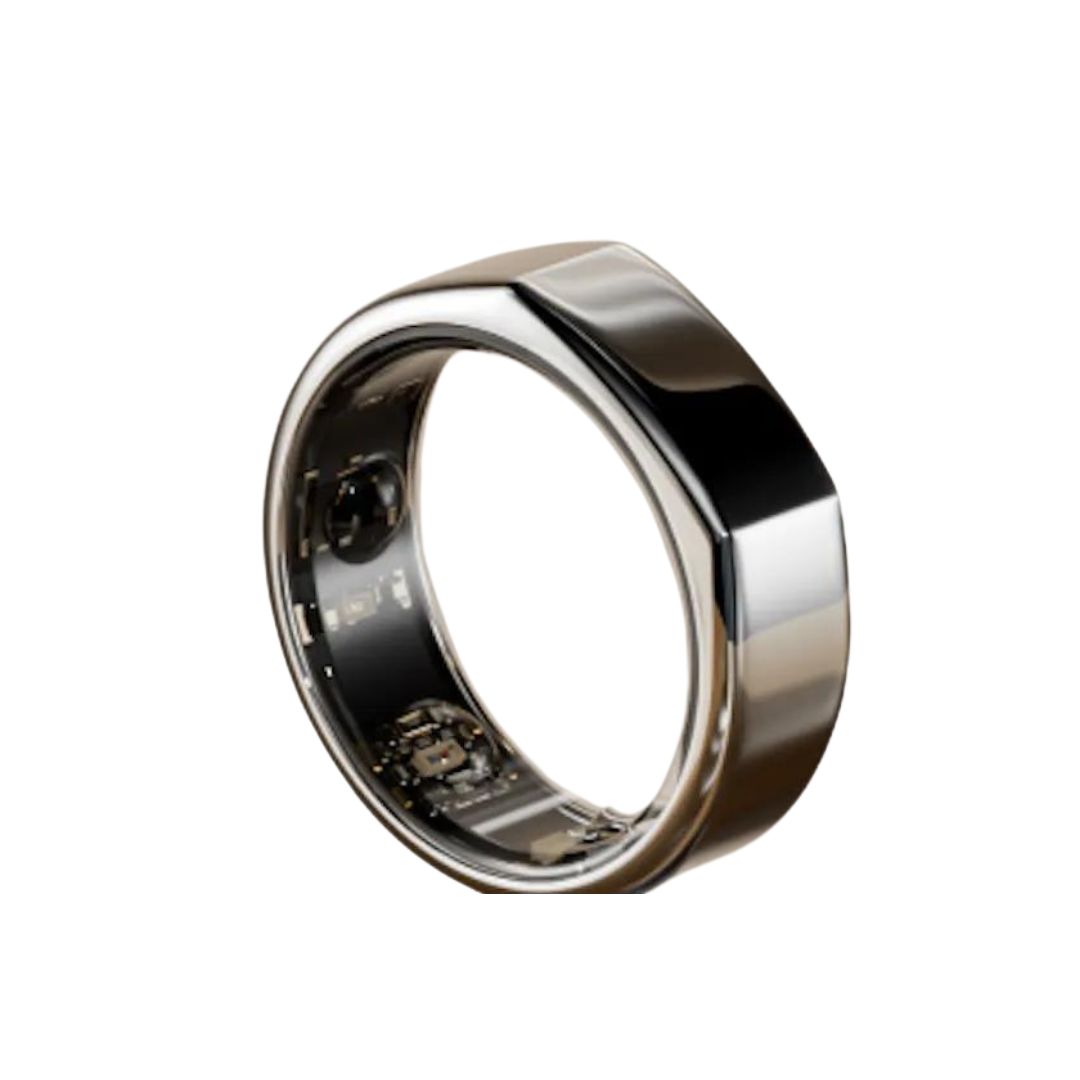
The social media sensation that is the Oura Ring makes a great option if you're not a fan of wearing fitness trackers on your wrist. Sunil actually found it suited his personal jewellery style quite nicely. It's water-resistant up to 100 meters, pretty accurate and surprisingly chic.
What we thought when testing? "It’s the perfect way to keep track of your health without it being massively intrusive. I particularly enjoyed the sleep scoring and "Readiness" factor (a score that shows you how you might be able to handle the day ahead) and concise weekly reporting. There’s also the option to explore breathwork and guided meditations via the app on your phone.
I have a smartwatch (the Apple Watch SE) that measures my heart activity and sleep too, so it was interesting to see whether the data would match up. I compared the data from my watch (via the Welltory app synched to my phone) and the Oura ring, and for the most part, they gave very similar readings." - Sunil Makan, Editor
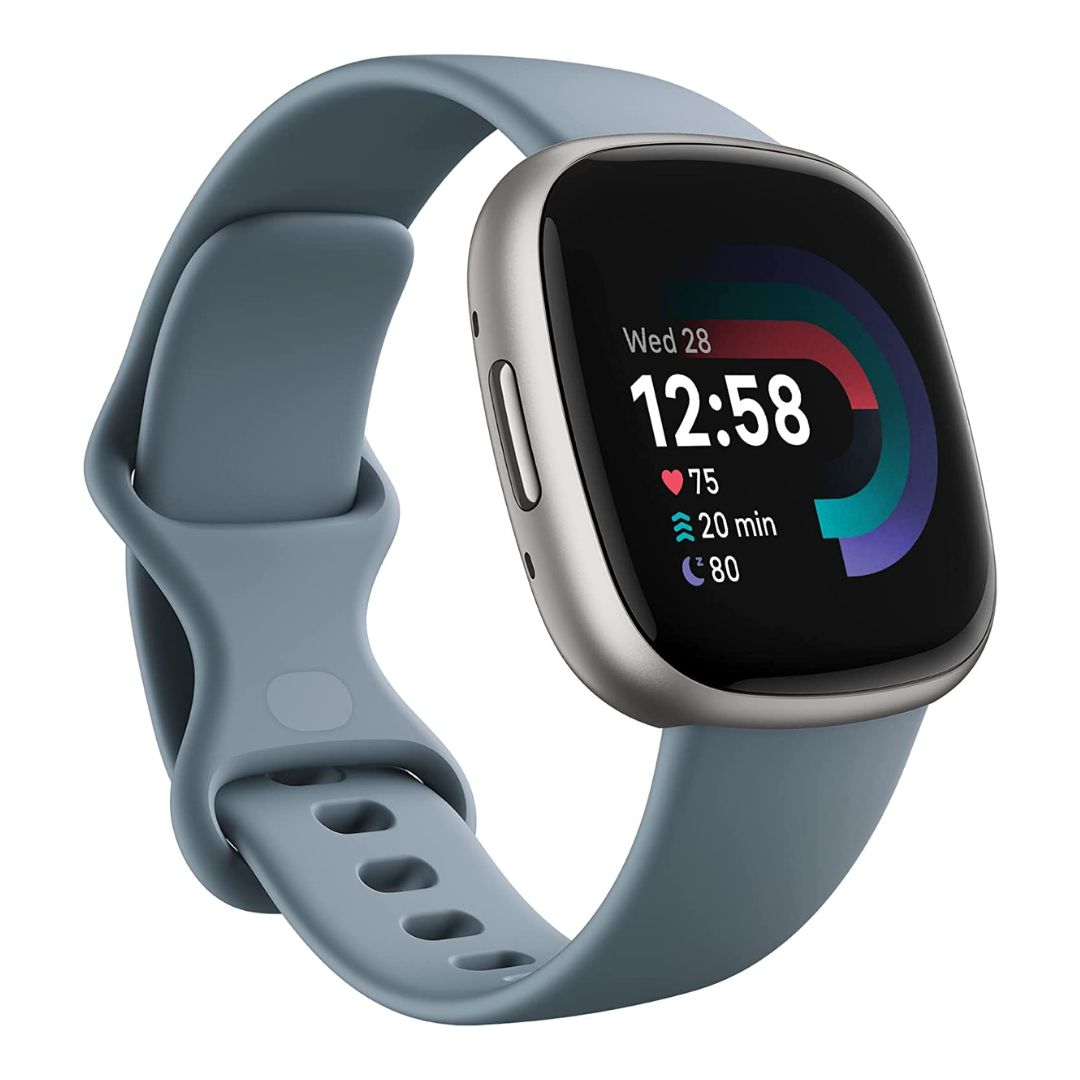
Fitbit's Versa 4 is popular for a reason - if you're after a stylish and accurate fitness tracker for tracking your steps and the occasional workout class, you can't go wrong with this model.
What we thought when testing: "The Fitbit Versa 4 has been dubbed the most advanced smartwatch from the brand, so as a Health Editor, I was eager to test it out. I trialled my first Fitbit back in 2015 and trained for my first-ever marathon using one. While they’re certainly great at pulling health stats, they weren’t so great on accurate stats and battery life back in the day - which is why I was pleasantly surprised to find that the Versa 4’s stats were similar enough to my much-loved Garmin Forerunner, and the battery life lasted around four to five days.
It looks great, accurately records your health stats, and lasts nearly a week. I'd buy if you exercise a few times a week and love tracking your workout classes and steps." - Ally Head, Senior Health Editor
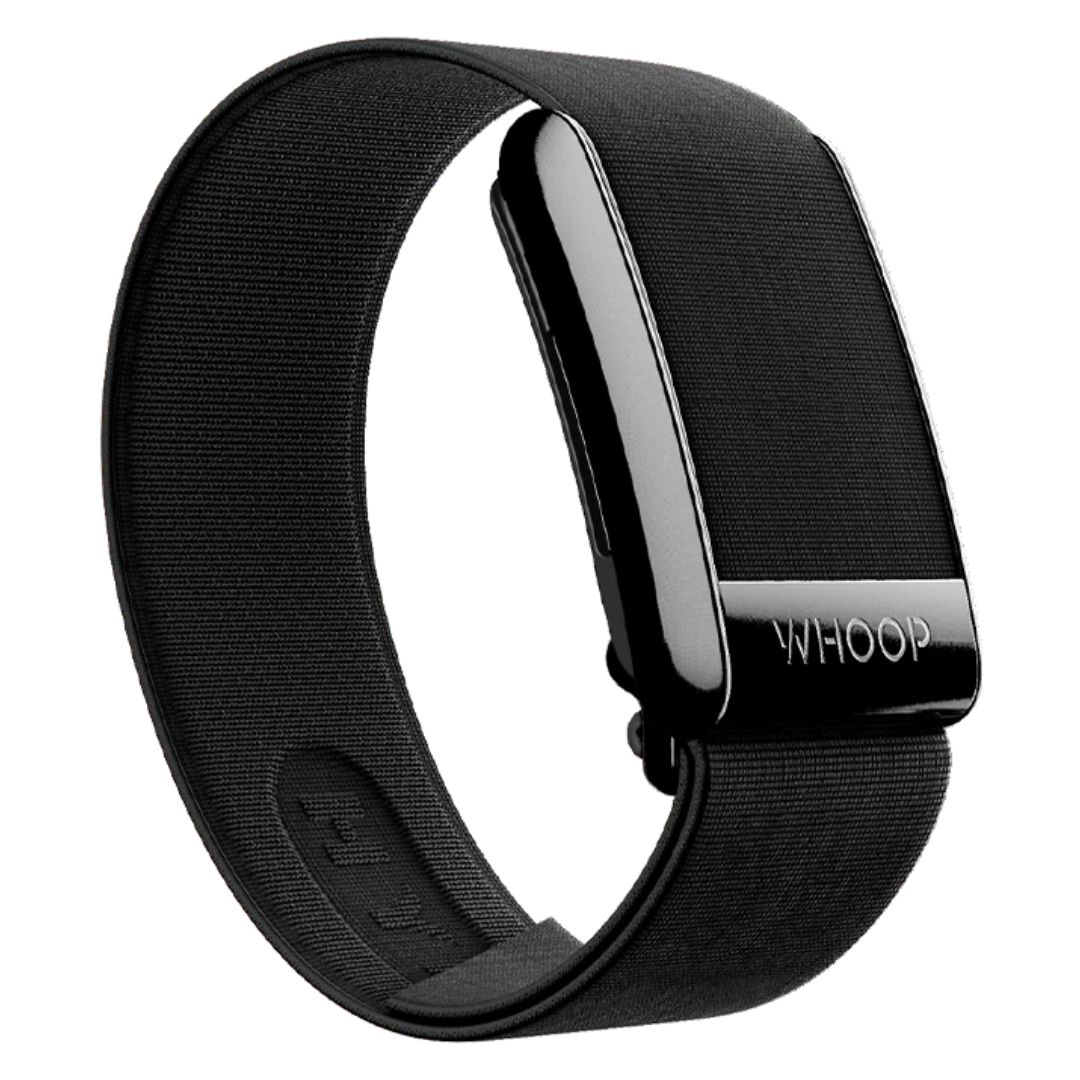
After a screenless fitness tracker? Introducing: WHOOP. The accurate stats are sent to the program's app on your phone rather than popping up on a screen, if you prefer to have the option of checking in on your progress rather than having a constant reminder of it. It also tracks not just your training, but your sleep and recovery too. If you're a bit anxious about exercising or want more an all-round progress report, this is a great tracker. The chic bracelet straps are also interchangeable (and there are loads to choose from), making this just about the more versatile fitness tracker we've seen.
What we thought when testing: "WHOOP have long been hailed as the fitness tracker of all fitness trackers, with celebrities and athletes alike swearing by their stats (we’re looking at you, Tom Daley). But it’s slightly different to other competitors. How? Well, it continuously collects data about everything from your recovery, to training, to sleep, to stress, versus other wearables that collect data during workouts and shut-eye.
You have to wear it for a few weeks before it starts feeding back your data, but I've never had more insight into my overall fitness levels, recovery score, and so on, and it was very accurate when cross-referenced with my Garmin." - Ally Head, Senior Health Editor
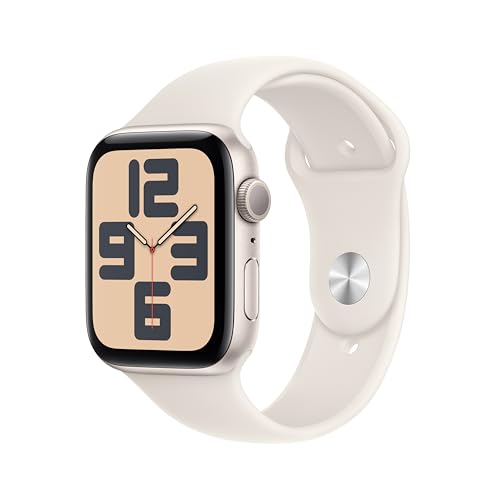
Ideal for those who want a sleek, everyday fitness watch, the Apple Watch offers style and substance. It looks chic, is extremely easy to use without the need for an app, and can be worn for watersports too.
What we thought when testing: "I've had my Apple Watch for years and I use it constantly. The main selling point for me is the water safe mode that makes it great for swimming, and I love that it doesn't look too tech-y - I can wear it to work and to the gym. I've always found the stats to be accurate for workouts, particularly runs, and I love that I can customise the band to make it suit my style. It does need charging every night, and it's a bit too chunky for me to sleep with, but it's by far the most stylish fitness watch I've worn." - Amelia Yeomans, Junior Shopping Editor
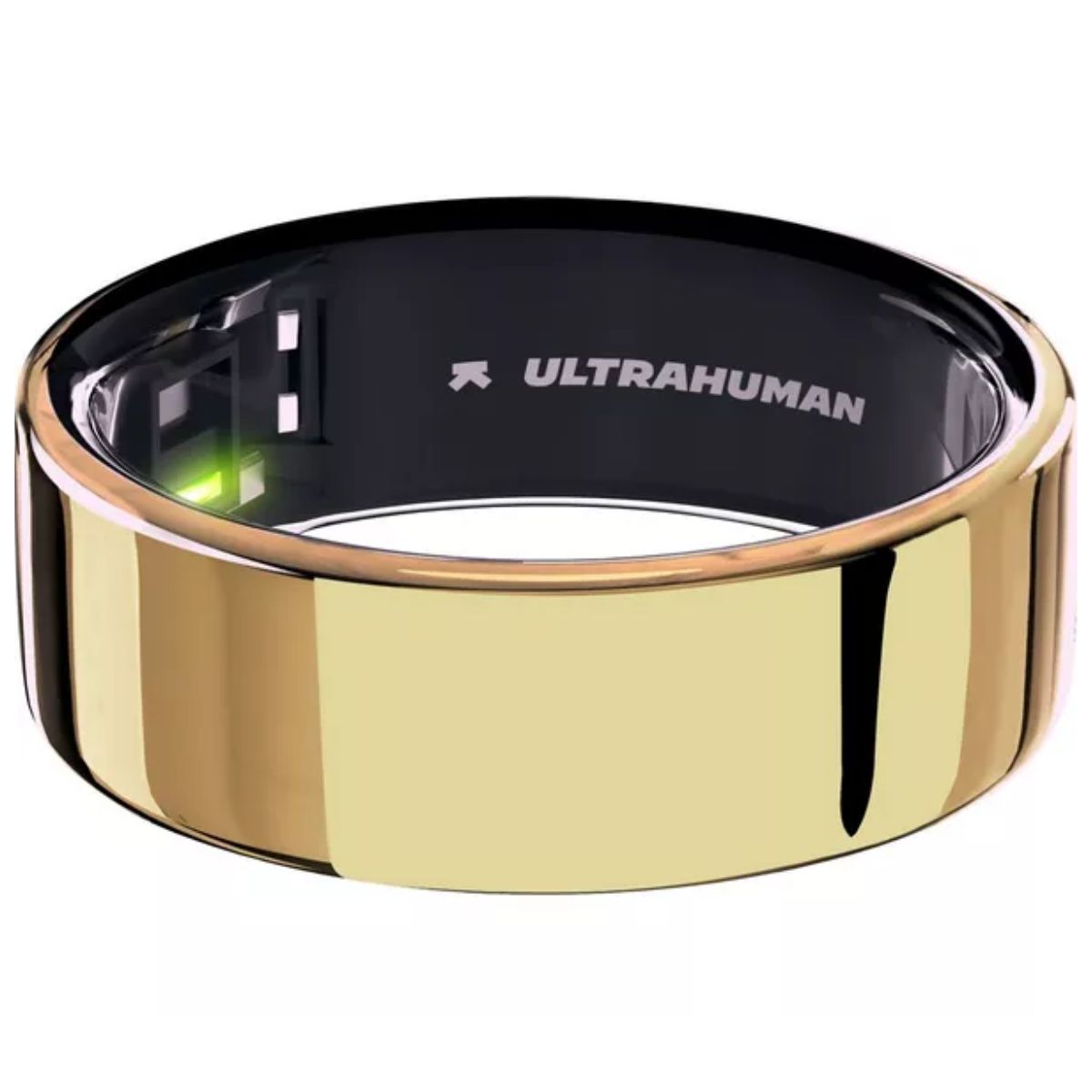
Lillie Bleasdale, Founder & Head Coach at PASSA, has been wearing the Ultrahuman Ring Air in Bionic Gold for several months.
What we thought when testing: "I've been mainly using it as a way to track my sleep as I don't like sleeping wearing a smart watch. I've found the app interface really easy to navigate and really useful for comparing sleep metrics day to day and helping me to ensure that I'm staying on top of enough recovery as an athlete. I've also found it really useful to have a monitor of my resting HR and HRV to indicate that I may be overworking or putting my body at risk of illness," she says.

Sunil Makan is the Editor of British Marie Claire. With over 15 years of publishing experience, working on print publications and their digital counterparts, national newspapers and digital pure plays he is an Editor, Strategist, Content Producer, Creative Director and Brand Consultant.
Sunil’s specialisms include Fashion, Beauty and Grooming, Lifestyle and Culture. Prior to Marie Claire, Sunil worked at ELLE, InStyle and Shortlist Media and freelanced at various other titles.
